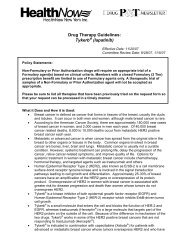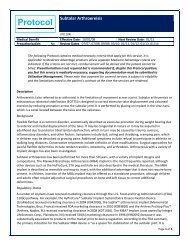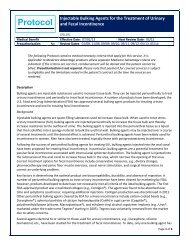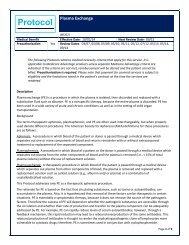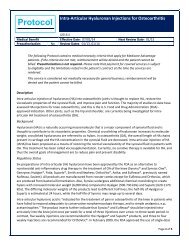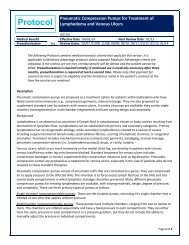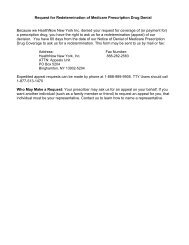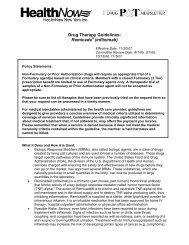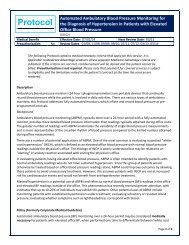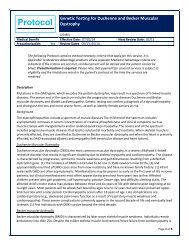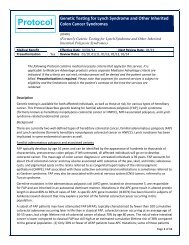Biofeedback as a Treatment of Fecal Incontinence or Constipation
Biofeedback as a Treatment of Fecal Incontinence or Constipation
Biofeedback as a Treatment of Fecal Incontinence or Constipation
You also want an ePaper? Increase the reach of your titles
YUMPU automatically turns print PDFs into web optimized ePapers that Google loves.
Protocol <strong>Bi<strong>of</strong>eedback</strong> <strong>as</strong> a <strong>Treatment</strong> <strong>of</strong> <strong>Fecal</strong> <strong>Incontinence</strong> <strong>or</strong> <strong>Constipation</strong> L<strong>as</strong>t Review Date: 03/14<br />
Policy (F<strong>or</strong>merly C<strong>or</strong>p<strong>or</strong>ate Medical Guideline)<br />
<strong>Bi<strong>of</strong>eedback</strong> f<strong>or</strong> constipation in adults may be considered medically necessary f<strong>or</strong> patients with dyssynergiatype<br />
constipation <strong>as</strong> demonstrated by meeting all three <strong>of</strong> the following criteria:<br />
1. Symptoms <strong>of</strong> functional constipation that meet ROME III criteria (see Policy Guidelines).<br />
2. Objective physiologic evidence <strong>of</strong> pelvic flo<strong>or</strong> dyssynergia (see Policy Guidelines) demonstrated by<br />
inappropriate contraction <strong>of</strong> the pelvic flo<strong>or</strong> muscles <strong>or</strong> less than 20% relaxation <strong>of</strong> b<strong>as</strong>al resting sphincter<br />
pressure by manometry, imaging <strong>or</strong> EMG;<br />
3. Failed a three-month trial <strong>of</strong> standard treatments f<strong>or</strong> constipation including laxatives, dietary changes, and<br />
exercises (<strong>as</strong> many <strong>of</strong> the previous <strong>as</strong> are tolerated).<br />
<strong>Bi<strong>of</strong>eedback</strong> is considered investigational <strong>as</strong> a treatment <strong>of</strong> constipation in adults and children in all other<br />
situations.<br />
<strong>Bi<strong>of</strong>eedback</strong> is considered investigational <strong>as</strong> a treatment <strong>of</strong> fecal incontinence in adults and children.<br />
Policy Guideline<br />
Rome III Diagnostic Criteria f<strong>or</strong> Functional G<strong>as</strong>trointestinal Dis<strong>or</strong>ders, available on line at:<br />
(http://www.romecriteria.<strong>or</strong>g/<strong>as</strong>sets/pdf/19_RomeIII_apA_885-898.pdf):<br />
Rome III diagnostic criteria f<strong>or</strong> functional constipation*<br />
1. Must include two <strong>or</strong> m<strong>or</strong>e <strong>of</strong> the following:<br />
a. Straining during at le<strong>as</strong>t 25% <strong>of</strong> defecations<br />
b. Lumpy <strong>or</strong> hard stools in at le<strong>as</strong>t 25% <strong>of</strong> defecations<br />
c. Sensation <strong>of</strong> incomplete evacuation f<strong>or</strong> at le<strong>as</strong>t 25% <strong>of</strong> defecations<br />
d. Sensation <strong>of</strong> an<strong>or</strong>ectal obstruction/blockage f<strong>or</strong> at le<strong>as</strong>t 25% <strong>of</strong> defecations<br />
e. Manual maneuvers to facilitate at le<strong>as</strong>t 25% <strong>of</strong> defecations (e.g., digital evacuation, supp<strong>or</strong>t <strong>of</strong> the pelvic<br />
flo<strong>or</strong>)<br />
f. Fewer than three defecations per week<br />
2. Loose stools are rarely present without the use <strong>of</strong> laxatives<br />
3. Insufficient criteria f<strong>or</strong> irritable bowel syndrome<br />
*Criteria fulfilled f<strong>or</strong> the l<strong>as</strong>t three months with symptom onset at le<strong>as</strong>t six months pri<strong>or</strong> to diagnosis<br />
Rome III diagnostic criterion f<strong>or</strong> dyssynergic defecation:<br />
Inappropriate contraction <strong>of</strong> the pelvic flo<strong>or</strong> <strong>or</strong> less than 20% relaxation <strong>of</strong> b<strong>as</strong>al resting sphincter pressure with<br />
adequate propulsive f<strong>or</strong>ces during attempted defecation<br />
Guidance on bi<strong>of</strong>eedback protocol:<br />
The recommended treatment course f<strong>or</strong> patients with constipation who meet criteria is up to six bi<strong>of</strong>eedback<br />
sessions over three months. This is consistent with the protocol used in key randomized trials showing benefit <strong>of</strong><br />
bi<strong>of</strong>eedback f<strong>or</strong> selected patients.<br />
Services that are the subject <strong>of</strong> a clinical trial do not meet our Technology Assessment Protocol criteria and are<br />
Page 3 <strong>of</strong> 5



